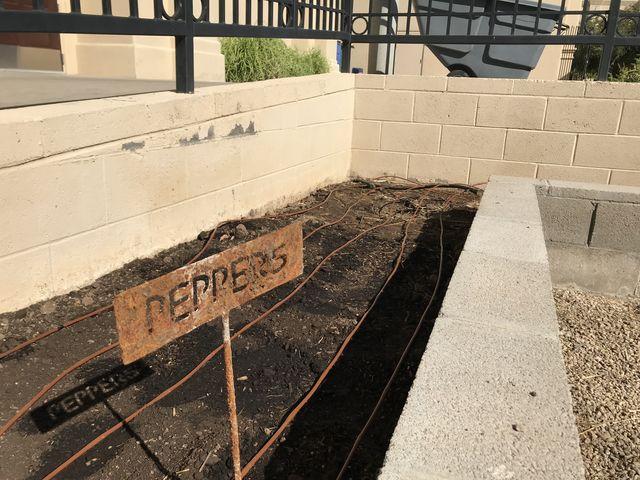Photo by Juan Sanchez ’19 | The garden near the Piper building has been equipped with new watering tubes, and the seeding process has begun.
Juan Sanchez ’20
THE ROUNDUP
According to Mrs. Sue Hornbeck, it is the gardening club’s mission to work for the betterment of the Earth while benefiting others.
Currently, the club is being run by the club moderator, Mr. Richard Cordova, with the help of Mrs.Hornbeck, and the club president, Ryan Blake ’21.
The club meets on Thursdays during lunch and varying days after school at the two gardens.
The vegetable garden is by the baseball field and the flower garden is located between the Eller and Piper buildings.
“Gardening is very peaceful, it keeps your mind chill. It’s relaxing, you [can] play music and it’s such a beautiful feeling seeing a seed becoming a plant,” Mr. Cordova said.
“Gardening actually helps you take some stress from school away and opens your mind more,” Blake said.
However, the club does not solely focus on benefiting the individual.
“The proceeds from the vegetable sales usually go to fund the Kino Border Initiative, specifically, the migrants who need help,” Mrs. Hornbeck said.
“This year, the club also plans to partner with Mr. Cooper Davis ‘10’s art class, growing flowers and vegetables for the purpose of making natural dyes that can then be used to dye yarn, baskets, and other various art projects,” Mrs. Hornbeck said.
According to Mrs. Hornbeck, the gardening club uses organic alternatives and promotes genetic diversity within markets in hopes to better the Earth.
“The use of chemicals in the garden is taken very seriously,” said Mrs. Hornbeck. In fact, the only chemical used in the gardening club is a weed killer. It is applied to weeds once, however, this is only so as soil solarization has failed.
The University of California Division of Agriculture and Natural Resources said that solar solarization is the act of covering the soil with a tarp in order to conserve solar energy, thus causing chemical changes in the soil, preventing weeds growth.
“The gardening club was not able to utilize soil solarization because the water source does not turn off (the water would disrupt chemical processes) without turning off the nearby buildings,” Mrs. Hornbeck said.
The gardening club also practices composting, evident as the Office of Faith and Justice regularly collects used coffee grounds to later incorporate within the soil according to Mrs. Hornbeck.
With the help of Mr. Patrick Dunkin, owner of Dunkin Traders, the gardening club is able to grow heirloom seeds. These seeds are not typically in stores as they have been replaced by their mass-produced counterparts according to Mrs. Hornbeck.
By allowing more diverse plants to grow, the garden club hopes to get more people to try new foods. They want to be a way in which people can be open to growth according to Mrs. Hornbeck .
While the gardening club does its best to work for others, its biggest problem lies with the members. They need more. As Blake said, “Turnup at Thursday” and that “it’ll bee grape.”



















